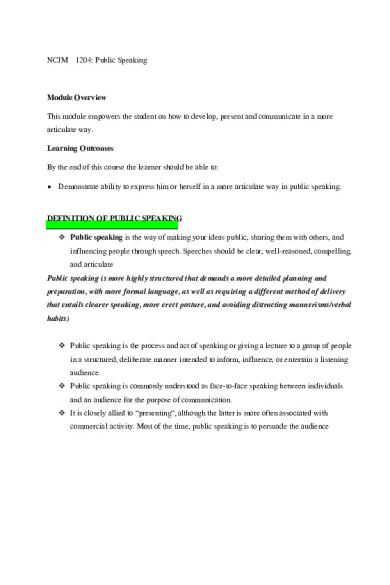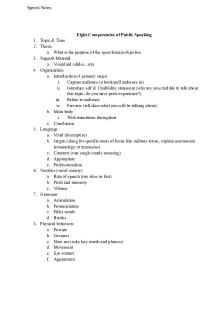DEFINITION OF PUBLIC SPEAKING PDF

| Title | DEFINITION OF PUBLIC SPEAKING |
|---|---|
| Author | nedinani katamu |
| Course | public sector economics |
| Institution | Cavendish University Uganda |
| Pages | 6 |
| File Size | 170.9 KB |
| File Type | |
| Total Downloads | 75 |
| Total Views | 148 |
Summary
This module empowers the student on how to develop, present and communicate in a more articulate way....
Description
NCJM 1204: Public Speaking
Module Overview This module empowers the student on how to develop, present and communicate in a more articulate way. Learning Outcomes By the end of this course the learner should be able to:
Demonstrate ability to express him or herself in a more articulate way in public speaking.
DEFINITION OF PUBLIC SPEAKING Public speaking is the way of making your ideas public, sharing them with others, and influencing people through speech. Speeches should be clear, well-reasoned, compelling, and articulate Public speaking is more highly structured that demands a more detailed planning and preparation, with more formal language, as well as requiring a different method of delivery that entails clearer speaking, more erect posture, and avoiding distracting mannerisms/verbal habits) Public speaking is the process and act of speaking or giving a lecture to a group of people in a structured, deliberate manner intended to inform, influence, or entertain a listening audience. Public speaking is commonly understood as face-to-face speaking between individuals and an audience for the purpose of communication. It is closely allied to “presenting”, although the latter is more often associated with commercial activity. Most of the time, public speaking is to persuade the audience
SEVEN ELEMENTS OF PUBLIC SPEAKING: Speaker, message, channel, listener, feedback, interference, and situation
Speaker-The person who is presenting an oral message to a listener (should be audiencecentral) Message- Whatever the speaker communicates to someone else (verbal or nonverbal) You send a message with your words, tone of voice, appearance, gestures, facial expression, and eye contact Don’t let your nonverbal distract from your verbal o Channel- The means by which a message is communicated o Listener- The person who receives the speaker’s message Frame of reference- The sum of a person’s knowledge, experience, goals, values, and attitudes. No two people have the exact same frame of reference Feedback- The message, usually nonverbal, sent from a listener to a speaker Interference- Anything that impedes the communication of a message. (External or internal) Situation- time and place where the communication occurs Ethnocentrism- belief that one’s own group or culture is superior to all other groups or culture IMPORTANCE OF PUBLIC SPEAKING Information The primary purpose of informative presentations is to share one’s knowledge of a subject with an audience. Reasons for making an informative speech vary widely. For example, you might be asked to instruct a group of coworkers on how to use new computer software or to report to a group of managers how your latest project is coming along Persuasive A second common reason for speaking to an audience is to persuade others. In our everyday lives, we are often called on to convince, motivate, or otherwise persuade others to change their beliefs, take an action, or reconsider a decision.
Entertaining. Entertaining speaking involves an array of speaking occasions ranging from introductions to wedding toasts, to presenting and accepting awards, to delivering eulogies at funerals and memorial services in addition to after-dinner speeches and motivational speeches. Key Takeaways Public speaking can be a great self-esteem booster. Public speaking engagements are great places to meet new social and professional contacts. If you would like to change the world, remember --public speaking is an effective platform for spreading revolutionary ideas.
PERSONAL BENEFITS OF PUBLIC SPEAKING: Public speaking can be intimidating. It is actually a common phobia. Overcoming this fear can be a satisfying personal victory. Public speaking is a great way to further personal development on many levels, since improving communication skills is helpful in every area of life, personal and professional. Public speaking engagements are great places to meet new people and build your social and professional networks. CAREER BENEFITS: Public speaking is a great way to showcase your talents, skills, and abilities. For professionals who want to build a personal brand, increase publicity, or earn a reputation as an expert, public speaking is a great way to further those ambitions. Public speaking engagements are great networking opportunities External Benefits. There is a strong correlation between communication skills and leadership. Speakers can use knowledge of persuasion to motivate others to take collective action to achieve desired goals. Modern communication technology allows speakers to share their message and influence audiences any place in the world, for the cost of an internet connection
and camera phone. Experienced speakers can use their skills to accomplish simple goals in daily life with new self-confidence. Trained speakers should ask, "How will I use my skills to influence the world around me?" and other relevant questions. ETHICS OF PUBLIC SPEAKING The goal of public speaking is to gain a desired response from listeners but not at any cost Speechmaking is a form of power and therefore carries with it heavy ethical responsibilities Ethics- the issue of right vs wrong in human affairs Idealistically public speakers would be truthful and devoted to the good of society but power if speech is often abused We should formulate meaningful ethical guidelines not inflexible rules. Your ethical decisions will be guided by your values, your conscience, your sense of right and wrong Ethical decisions- sound ethical decisions involve weighing a potential course of action against a set of ethical standards or guidelines Make sure your goals are ethically sound Explore your topic as thoroughly as possible by learning about all sides and viewpoints Juggling statistics, quoting out of context, misrepresenting sources, painting tentative findings as firm conclusions, citing unusual cases as typical examples, and substituting innuendo and half-truths for evidence and proof are subtle forms of being unethical Name-calling: the use of language to defame, demean, or degrade individuals or groups Global plagiarism – stealing a speech entirely from a single source and passing it off as one’s own Patchwork plagiarism – stealing ideas or language from two or three sources and passing them off as one’s own Incremental plagiarism- failing to give credit for particular parts of a speech that are borrowed from other people Lead into quotations by saying “according to …... in his book …….” Paraphrase- Restate or summarize an author’s ideas in your own words
You don’t have to quote basic standard facts of someone’s life As a listener you should be courteous/attentive, avoid prejudging the speaker, and maintain the free and open expression of idea
OVERCOMING NERVES ■ Public speaking doesn’t have to feel as overwhelming, never-racking or daunting Why do we get nervous? 1. Thinking about public speaking could lead to anxiety 2. Fear of the un known 3. Anxiety about the known
WHAT DOES PRESENTATION ANXIETY LOOK LIKE AND FEEL LIKE? ■ A pounding heart ■ Shaking hands and legs ■ Sweaty palms and forehead ■ Facial ticks and twitches ■ A quivering voice ■ A flushed or pale face ■ Nausea ■ Dry mouth ■ Racing thoughts ONE TECHNIQUE TO PRACTICE ■ Put a new label ”EXCITED” over the old label “SCARED” ■ Keep telling yourself you are enthusiastic, excited, even thrilled to be speaking to this group of people. ■ The goal is to make the adrenaline rush work in your favour before, during and after your presentation. ■ Stop thinking of your audience as your judges and start thinking of them as your colleagues ■ Focus less on what this audience can do to you and more on what you can do for them
■ Prepare but don’t over prepare ■ Get moving ■ Play out your weaknesses ■ Make yourself laugh...
Similar Free PDFs

DEFINITION OF PUBLIC SPEAKING
- 6 Pages

Public Speaking
- 1 Pages

Public Speaking Midterm Review
- 6 Pages

Teknik Dasar Public Speaking
- 7 Pages

Successful-public-speaking
- 47 Pages

Public speaking com165
- 4 Pages

Public Speaking 3-11
- 2 Pages

Public Speaking Notes 1
- 9 Pages

Public Speaking Notes
- 20 Pages

Public Speaking Fallacies
- 2 Pages

Silabus Public Speaking
- 6 Pages

Public Speaking Midterm Review
- 3 Pages

Public Speaking Final Review
- 9 Pages

Public Speaking Reflection
- 1 Pages
Popular Institutions
- Tinajero National High School - Annex
- Politeknik Caltex Riau
- Yokohama City University
- SGT University
- University of Al-Qadisiyah
- Divine Word College of Vigan
- Techniek College Rotterdam
- Universidade de Santiago
- Universiti Teknologi MARA Cawangan Johor Kampus Pasir Gudang
- Poltekkes Kemenkes Yogyakarta
- Baguio City National High School
- Colegio san marcos
- preparatoria uno
- Centro de Bachillerato Tecnológico Industrial y de Servicios No. 107
- Dalian Maritime University
- Quang Trung Secondary School
- Colegio Tecnológico en Informática
- Corporación Regional de Educación Superior
- Grupo CEDVA
- Dar Al Uloom University
- Centro de Estudios Preuniversitarios de la Universidad Nacional de Ingeniería
- 上智大学
- Aakash International School, Nuna Majara
- San Felipe Neri Catholic School
- Kang Chiao International School - New Taipei City
- Misamis Occidental National High School
- Institución Educativa Escuela Normal Juan Ladrilleros
- Kolehiyo ng Pantukan
- Batanes State College
- Instituto Continental
- Sekolah Menengah Kejuruan Kesehatan Kaltara (Tarakan)
- Colegio de La Inmaculada Concepcion - Cebu

